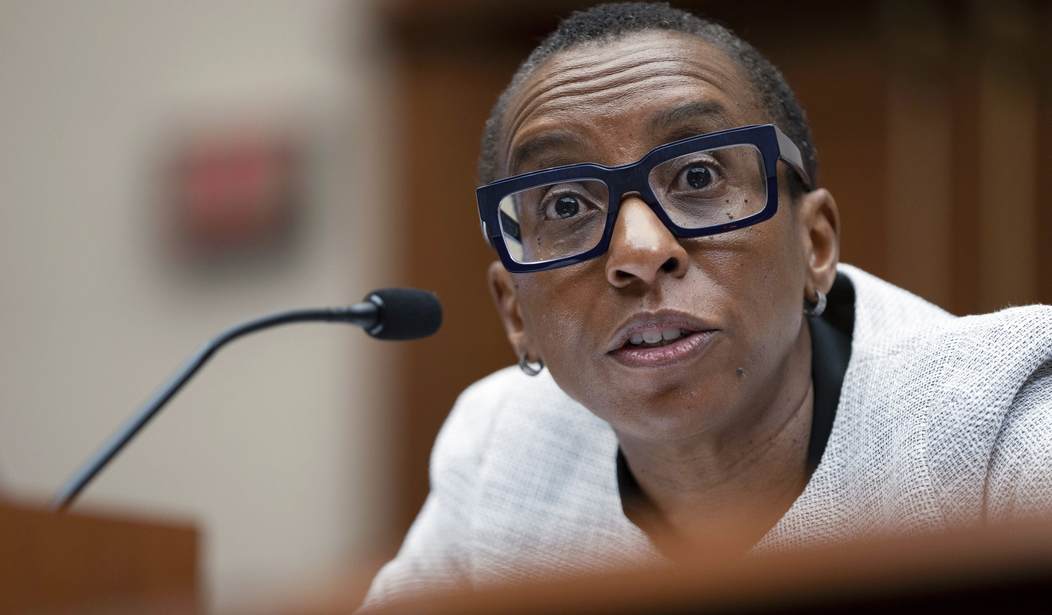It was almost inevitable that after the drip, drip, drip of plagiarism allegations against Harvard President Claudine Gay began, the tap would not soon run dry. After two rounds of complaints filed against President Gay's limited body of scholarly work, a third pointing at an additional six alleged instances of plagiarism dropped on Monday evening — bringing the total number of complaints lodged against her near 50.
Again, this revelation of six new allegations in a fresh complaint comes courtesy of our friends at The Washington Free Beacon. And these, as the Free Beacon's Aaron Sibarium notes, are some of the most flagrant (alleged) violations yet.
The previously unreported allegations arise from a 2001 article by President Gay in which she "lifts nearly half a page of material verbatim from another scholar, David Canon, a political science professor at the University of Wisconsin."
"At one point, Gay borrows four sentences from Canon's 1999 book, Race, Redistricting, and Representation: The Unintended Consequences of Black Majority Districts, without quotation marks and with only minor semantic tweaks," the Free Beacon summarizes. "She does not cite Canon anywhere in or near the passage, though he does appear in the bibliography." The fresh allegations also noticed that "Gay’s first two footnotes are copied verbatim from Canon’s endnotes."
There are also new allegations against Gay's already-in-question dissertation, including an instance in which she "lifts a full sentence from her thesis advisor, Gary King, to describe a mathematical model" but "does not cite King in parentheses or put his words in quotation marks."
In addition, the complaint points to other instances in which now-President Gay "repeatedly" quoted from Frank Gilliam's 1996 paper "Exploring Minority Empowerment: Symbolic Politics, Governing Coalitions and Traces of Political Style in Los Angeles" without attribution and "changing just a few words here or there."
Recommended
More from the Beacon's latest damming dispatch on President Gay:
Though Harvard's governing board, the Harvard Corporation, said in mid-December that it had reviewed Gay’s published oeuvre and found several cases of "inadequate citation," it did not identify any of the examples described in the new complaint, which was submitted to the school’s research integrity officer, Stacey Springs, and obtained by the Free Beacon.
The discrepancy raises troubling questions not just about the scope of Gay’s plagiarism, which appears to afflict half of her published works, but also the thoroughness and seriousness of the Corporation’s probe, which the board described as "an independent review by distinguished political scientists."
Indeed. As the new complaint against Gay's work notes, Harvard's "investigation" into its president's work — a rushed effort that came as part of the Harvard Corporation's attempt to completely squash stories about such allegations — "was too brief to inspire confidence." In a predictable twist of fate, the supposedly elite institution's seeming attempts at a cover up are as bad as the alleged crimes of plagiarism, if not worse.
"Experts on plagiarism told CNN that 'Independent reviews into plagiarism typically last much longer—anywhere from six months to several years,'" the complaint reminds. "Harvard concluded its sham review prematurely, within weeks, but you should still expect to hear more of my own review over the coming months," the complainant pledged.
The Free Beacon reached out to each of the authors alleged to have been plagiarized by Gay in the latest complaint. Canon said he was "not at all concerned" about the contents of the new complaint and claimed the allegations aren't "even close to an example of academic plagiarism." King and Gilliam did not return the Free Beacon's requests.
President Gay and the Harvard Corporation might have hoped a new year would bring some better fortunes, but so far it looks like their attempts to tamp down negative attention have only fueled the fire against them.
























Join the conversation as a VIP Member